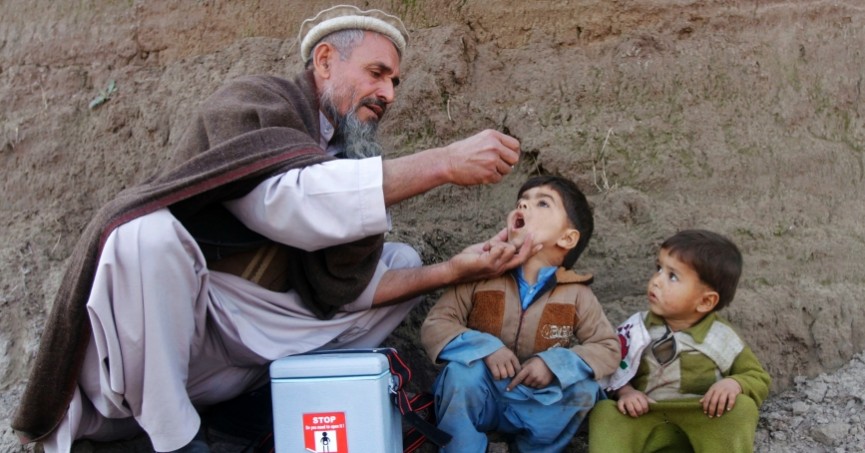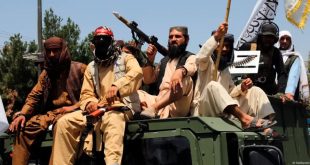By Mansoor Faizy-KABUL: For the first time Afghanistan and Pakistan nodded for a joint fight where it seems a win-win situation for both the countries, and that’s a joint fight against polio, a crippling disease which left a large number of children in uncertain situation in the two neighboring countries.
A three-member delegation from the Afghan national polio team paid visit to Pakistan to monitor anti-polio drive on January 11.
The Head of Pakistan’s Emergency Operations Centre (EOC) Dr Rana Safdar told Pakistani media that one type of virus, R4B5C, had been traveling from Nangarhar to Khyber Agency and onwards to other parts of the two countries.
Safdar added that Afghanistan and Pakistan have decided to draft collective strategies for eradication of the polio virus. Earlier, the chief of EOC furthered that polio campaigns would start on the same day on both sides of the Durand Line to ensure that every child is vaccinated when he or she is traveling.
Since long polio remained endemic in the two countries due to security reasons, because the polio workers could not reach those areas where there is insecurity. Moreover, polio virus could also be transferred to the two countries as hundreds of people cross the Durand Line on daily basis. Since the two countries agreed to fight polio, they should intensify efforts to halt the spread of the crippling polio virus, including better screening of travelers at the crossing points. Afghanistan and Pakistan are the only countries in the world that have been transferring the polio virus to each other.
It is also important for the two countries to develop coordination and quality of cross-border vaccination and make sure that nobody should remain unvaccinated to prevent the risk of its spread. There is no denying to the fact that Afghanistan and Pakistan could not succeed in anti-polio campaign unless addressing the root cause which is insecurity. Last year, a female polio campaigner was shot dead in southern Kandahar province. Two unknown gunmen killed her when she was going house to house to ensure no child was left unvaccinated against polio. She was killed on the last day of the anti-polio campaign. Like her, many other polio staffers were also shot dead in Afghanistan and in Pakistan.
Islamic State, also known as Daesh, in Nangarhar province prevented polio teams in three districts of the province from administrating vaccine to children. Health officials of Nangarhar province last year admitted that they were unable to launch anti-polio drive in Achin, Haskamina and Mina Kot districts of the province due to insecurity posed by Daesh fighters.
Moreover, in Pakistan the dead bodies of two polio workers and two levies personnel were found last year in the mountainous area of Killi Murgha Kibzai in Bolchistan province. Pakistani media said that two polio workers and two security guards went missing and latter their dead bodies were found.
The four staffers had gone to a village close to Afghan border for administrating anti-polio drops to children. But their dead bodies were returned to their families. It indicates that groups that oppose anti-polio campaign are the enemy of Afghanistan and Pakistan. There is no second opinion in it. Reports suggest that insurgents in the two countries accuse health workers of being spies, but despite pressure, anti-polio vaccination drive in Afghanistan was a successful one as many children were vaccinated last year.
Last year, Minister of Public Health Ferozuddin Feroz introduced the Inactivated Polio Vaccine (IPV) into the schedule of routine vaccinations program for all children under the age of one. Over one million children would benefit from IPV in the country.
Introduction of IPV into the routine immunization schedule in Afghanistan is part of a worldwide rollout of the vaccine across 126 countries, and it is a largest and fastest globally coordinated vaccine introduction project in the world. It is funded as part of the budget of the Global Polio Eradication Initiative and support is channeled through Gavi, the Vaccine Alliance, WHO and UNICEF.
However, more efforts must be made by Afghanistan and Pakistan in a bid to cover those children that had no access to anti-polio vaccine.
Without security there is no possibility to see Afghan-Pak anti-campaign efforts successful. Moreover, if they want to rescue their young blood from crippling, taking honest steps toward bringing peace in insecure areas is a must and if needed they can use military power as well. Improved security is crucial for success of the anti-polio drives and sincere approach from both states is need of the hour.
This worth mentioning that Nigeria has been declared “polio-free” by World Health Organization and removed from the list of the countries where polio is endemic. But, polio remains endemic in Afghanistan and Pakistan.
 Afghanistan Times
Afghanistan Times




